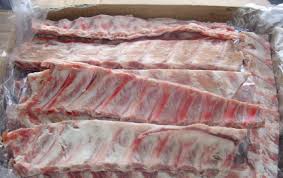
THE Department of Agriculture (DA) is cool to the notion of easing its rules on the sale of frozen pork to wet markets, as doing so will compromise “food safety” standards.
Agriculture officials on Tuesday noted that they have already allowed the sale of frozen pork—imported under the MAV plus program—outside the NCR plus region so that more areas in the country may benefit from cheaper imported pork.
However, relaxing government rules on the sale of frozen pork in wet markets, such as the requirement of a proper refrigeration system, is a different matter.
“The only constraint they have in selling [to wet markets] is whether they have the cold storage facilities such as chillers,” Agriculture Undersecretary Fermin D. Adriano said in a virtual press briefing on Tuesday.
Agriculture Undersecretary Ariel T. Cayanan said relaxing Administrative Order (AO) 6 Series of 2012, which outlines the guidelines on handling frozen meat in wet markets, may “compromise food safety.”
“There are things that we can work within the box but going outside the box will compromise food safety. I cannot speak on behalf of Secretary [Karl] Chua, maybe he is referring to relaxing the distribution rules but the manner how you handle [frozen pork], that is enforcement and regulation,” he said.
“They can sell frozen pork [in wet markets] as long as they have chillers,” he added.
Under AO 6, chilled meat products sold to market should not be frozen and shall maintain a temperature not higher than 10 degrees Celsius, while frozen meat should be stored, held and sold at a temperature not higher than zero degrees Celsius and should be stored in a meat cold storage at less than -18°C. (Related story: https://businessmirror.com.ph/2018/04/21/phls-stiff-meat-trade-rule-stays/)
Last week, Socioeconomic Planning Secretary Karl Kendrick T. Chua said the government must ease its rules on the sale of frozen pork to wet markets to further temper food inflation, which he noted remains elevated due to expensive pork products.
Pork prices remain high in areas outside the National Capital Region (NCR) since certain existing government rules hinder the sale of imported frozen pork to wet markets, Chua said.
“One reason for that is some restrictions that prevent some of these imported supplies from being sold elsewhere, especially in wet markets. This is something we think should be more relaxed so more people can benefit,” he explained.
Local industry groups such as the National Federation of Hog Farmers Inc. (NFHFI) oppose Chua’s idea, arguing that it will harm consumers’ health and local production.

